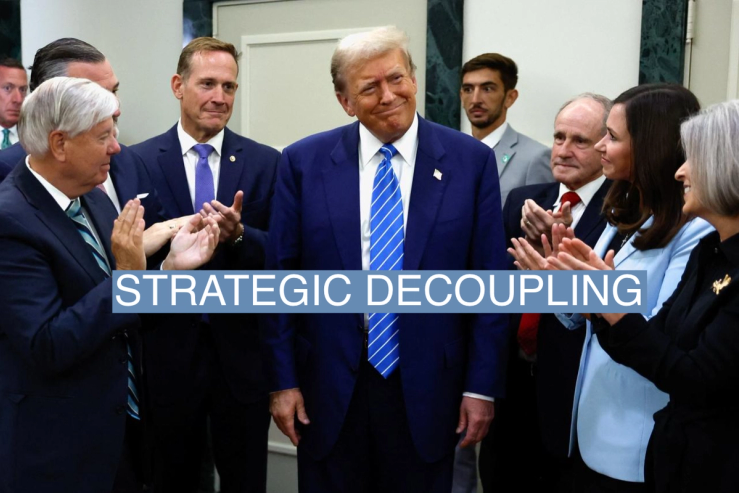The News
Donald Trump is gearing up for a sequel to his trade war with China if he returns to the White House. And this time, advisers and allies say he’s much less interested in a deal.
That’s because Beijing failed to live up to its commitments under the “phase one” trade agreement negotiated by Trump’s team during his first administration. Trump and his former aides, some of whom would be likely to join him in a second stint at the White House, are also deeply distrustful of China over its lack of transparency around the COVID-19 pandemic.
“I don’t think we’re going to see a deal like we saw in the first term,” Robert O’Brien, who served as Trump’s national security adviser, said in an interview. “I think people were generally happy with phase one, but as it turned out, the Chinese didn’t honor it.”
Trump, whose campaign did not respond to outreach from Semafor, has already floated imposing tariffs of 60% or more on all Chinese imports as part of a wider protectionist agenda. During a meeting with House Republicans on Capitol Hill last week, the former president described tariffs as a “strong tool for the executive branch” to extract concessions from China and protect US industries, Nebraska Rep. Don Bacon told reporters. (According to others in the room, he also at one point seemed to float replacing the entire personal income tax with tariff revenue.)
But allies and alums of Trump’s first administration say an aggressive China economic policy would potentially go much further than just tariffs. They say it could include more stringent export controls of key US technologies, aimed at hampering Chinese industry, and restrictions on US investments in China. Some believe Trump may also try to bring together an international coalition to limit China’s budding dominance in electric vehicle exports, with an eye to boxing in electric-vehicle giant BYD.
Many anticipate that former US Trade Representative Bob Lighthizer would return to captain Trump’s economic strategy on China. Lighthizer, who declined to be interviewed for this story, has called for a “strategic decoupling” between the US and Chinese economies, and privately told people that a second administration would aggressively pursue that goal. And there may be fewer business-oriented advisors in the White House to temper a protectionist push this time.
The business world is already bracing itself: Consultants and Wall Street advisers told Semafor they’ve started seeing a steady stream of clients asking how to strategize around tariffs.
During the first Trump presidency, “it was like, no way he’s really going to do that,” said Henrietta Treyz, director of economic policy research at Veda Partners. “The starting point for investors now is how long do I have before these tariffs go on.”
Still, among some investors, there’s a “healthy debate” brewing “as to whether this is going to be saber rattling to lead towards negotiations or if this will be the final act in the protectionist agenda,” said Isaac Boltansky, director of policy research at BTIG.
Step Back
During his first term, Trump embarked on a dramatic, tit-for-tat tariff battle with China that rocked markets and fueled fears about a potential recession. But as concerns that the conflict would spiral out of control mounted, the two countries chose to de-escalate, striking a phased deal in which China agreed to purchase an additional $200 billion of US wares. At a signing ceremony, Trump described the pact as “historic” and “momentous.”
Those extra purchases never happened; in the years that followed, China actually bought fewer American goods than before the trade spat. A former Trump administration national security official said Trump is emboldened to try tougher tariffs as a result.
Trump “views the lack of success of the tariffs last time in terms of changing Chinese behavior not as a reflection of the tariffs not having worked, but as a reflection of the advice he was given to be more moderate on tariffs being a failure,” the former official said.
Bad blood left over from the pandemic is another key factor in Trump’s thinking, according to those close to him and his team. “We believe President Xi [Jinping] basically told us a lie when it came to the origins of COVID,” Keith Kellogg, who served as national security adviser to former Vice President Mike Pence in the White House, told Semafor. “The relationship with China, while originally good, was fractured because of COVID.”
Steve Yates, who chairs the China initiative at the America First Policy Institute, told Semafor he would “never put a deal out of the question.” But, he added, “the biggest difference between a Trump 1.0 and a Trump 2.0 very likely would be that there are no illusions about the nature and intent of the counterpart.”
Know More
A new trade war with China could have different dynamics from Trump’s first effort, in which the US took a largely go-it-alone approach. O’Brien said that this time around Trump would likely work with allies in Europe and Asia to put more pressure on Chinese companies like BYD.
BYD “is trying to put every carmaker in the world out of business by dumping CCP subsidized cars everywhere,” he said, referring to the Chinese Communist Party. “The Japanese, Koreans and Germans are starting to see the danger. If China destroys the German auto industry, which could happen very quickly, Germany is in real trouble. So I think we’re going to have some common ground with our allies on dealing with Chinese EVs and battery technology going forward.”
Dan Eberhart, a GOP donor who recently attended a roundtable with Trump in Houston, told Semafor Trump zeroed in on Chinese electric vehicles, which were recently subjected to tariffs by the Biden administration.
“Trump was well informed on China dumping EVs in Europe and soon to be in the US and said he wouldn’t allow it,” Eberhart said. “I think he’s a protectionist at heart and really looking to be even tougher in a second term.”
Nazak Nikakhtar, a top Commerce Department official under Trump, predicted more export controls on critical technologies, as well as legacy chipmaking technology to curb Beijing’s semiconductor development. The Trump team will also likely take a “serious look at broadening outbound investment restrictions,” Nikakhtar said.
That would represent a continuation of the Biden administration’s strategy on national security technology restrictions, which has hinged on export controls imposed by the Commerce Department and an executive order to screen outbound US investment in certain sectors in China, such as artificial intelligence and quantum technology.
Trump’s campaign website also calls for reshoring essential medical and national security supplies in four years and a ban on Chinese ownership of critical infrastructure.
Michael Allen, managing director at the strategic advisory firm Beacon Global Strategies, said he believes a Trump administration’s approach would be broad and sweep up more than just the national security and technology supply chains Biden has tended to focus on. “They’re going to be very aggressive on the decoupling,” said Allen, who estimated that he is briefing clients three times a week on what to expect.
Morgan’s view
For all the talk of showdown, Trump’s second term China strategy may depend heavily on the team shaping it.
I hear plenty of China hawks listed as potentially holding important roles in a second Trump administration. One of them is Lighthizer; another is Peter Navarro, who in a recent Q&A with Semafor trashed the idea of “globalists” like Gary Cohn or Steven Mnuchin returning to the executive branch were Trump to secure another term.
But Trump’s first term China policy was marked by an internal struggle over how far to take his trade war, with Trump himself often veering between the two sides. Navarro frequently found himself at odds with Larry Kudlow, the free-trade-loving director of Trump’s National Economic Council. Some see the same fight potentially playing out again in a second term, if Trump leans toward some of the business-minded names that have been floated — like John Paulson or even Jamie Dimon.
“I think people who act as if the whole thing is going to be China hawk business all the time don’t understand the president’s way of operating,” the former Trump national security official told me.
Trump can also be unpredictable and transactional. This year, he opposed legislation that aims to force a sale of TikTok by threatening a ban of the Chinese-owned app in the US, despite pushing a similar policy during his administration. Trump, who has cultivated a relationship with ByteDance investor and GOP donor Jeff Yass, joined the platform in a bid to reach out to young voters and recently vowed to “never ban” the app. (O’Brien insisted that Trump “has been very clear on Chinese espionage against the US and Chinese propaganda and influence operations against the US” and that the legislation would go forward under a Trump presidency.)
To put it another way: Trump may be preparing for a showdown with China now. But if it serves his interests, there’s always a chance he will change his mind.
The View From China
Liu Pengyu, a spokesman for the Chinese embassy in Washington, declined to comment directly on the US presidential election but said Beijing firmly opposes “any attempt to manipulate China-related issues, exploit China-U.S. relations and damage China’s interests during the elections.”
“China has all along opposed politicizing trade issues. Tariff hikes only push up the costs of commodities, incurring heavier prices on American companies and consumers,” he added.
Notable
Chinese government officials are “bracing for drama” in US relations if Trump is elected again in November, The Wall Street Journal reported.
Eight in 10 Americans are “somewhat” or “extremely” concerned about China’s trade practices, according to new polling commissioned by the Ronald Reagan Institute.
Joseph Zeballos-Roig contributed reporting.


